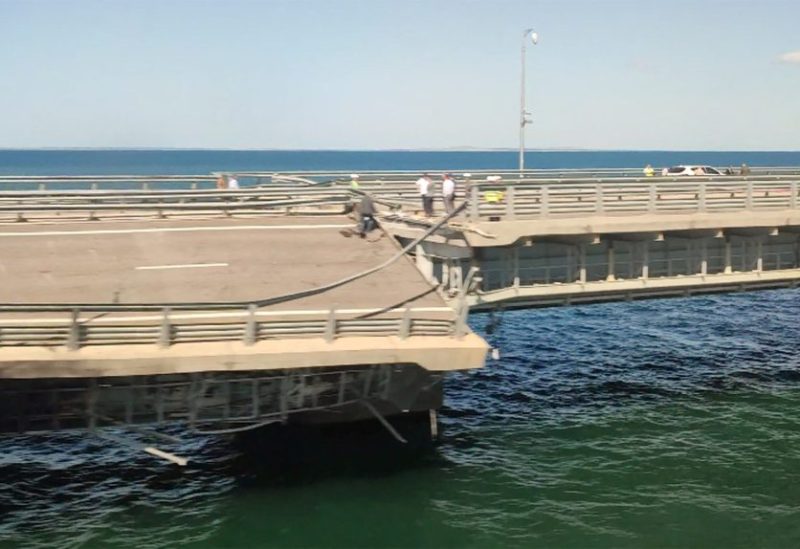
A view shows the Crimean bridge connecting the Russian mainland with the peninsula across the Kerch Strait, Crimea, July 17, 2023. REUTERS/Stringer
Russia stopped taking part in the one-year-old U.N.-mediated agreement on Monday, raising concerns in developing nations that rising food prices may make food unaffordable.
A detonation hours earlier destroyed Russia’s bridge to Crimea, which Moscow claimed was the result of a strike by Ukrainian sea drones. Russia claimed responsibility for the terrorist strike on the road bridge, a crucial route for Russian troops fighting in Ukraine, which left two people dead and their daughter injured.
The Kremlin said there was no link between the attack and its decision to suspend the grain deal, over what it called a failure to meet its demands to implement a parallel agreement easing rules for its own food and fertilizer exports.
“Unfortunately, the part of these Black Sea agreements concerning Russia has not been implemented so far, so its effect is terminated,” Kremlin spokesman Dmitry Peskov told reporters on a conference call.
U.N. Secretary-General Antonio Guterres signalled that Russia’s withdrawal meant that the related pact to facilitate Russia’s grain and fertilizer exports was also terminated.
“Today’s decision by the Russian Federation will strike a blow to people in need everywhere,” he told reporters.
Moscow said it would consider rejoining the grain deal if it saw “concrete results” on its demands but that its guarantees for the safety of navigation would meanwhile be revoked.
In Washington, the White House said Russia’s suspension of the pact “will worsen food security and harm millions”.
Ukraine and Russia are some of the world’s biggest exporters of grain and other foodstuffs and any interruption could drive up food prices across the globe, especially in the poorest countries.
Shashwat Saraf, the emergency director in East Africa for the International Rescue Committee (IRC), said the impacts would be far-reaching in Somalia, Ethiopia and Kenya, which have been facing the Horn of Africa’s worst drought in decades.
“I don’t know how we will survive,” said Halima Hussein, a mother of five children living in a crowded camp in Somalia’s capital Mogadishu for people displaced by years of failed rains and violence.
Ukraine’s President Volodymyr Zelenskiy raised the prospect of resuming grain exports without Russia’s participation, suggesting Kyiv would seek Turkey’s support to effectively negate the Russian de facto blockade imposed last year.
“We are not afraid,” spokesperson Serhiy Nykyforov quoted Zelenskiy as saying. “We were approached by companies, shipowners. They said that they are ready, if Ukraine lets them go, and Turkey continues to let them through, then everyone is ready to continue supplying grain.”
The blast on the road bridge to Crimea could have a direct impact on Moscow’s ability to supply its troops in southern Ukraine, and reveals the vulnerability of Russia’s own Black Sea infrastructure to devices such as seaborne drones: small, fast remote-controlled boats packed with explosives.
Images showed a section of the road bridge had come down and traffic was halted in both directions, although a parallel railway bridge was still operational. Blasts were reported before dawn on the 19-km (12-mile) bridge, which Russian President Vladimir Putin ordered built after seizing and annexing the peninsula from Ukraine in 2014.
Putin told officials repair work should start quickly and that Russia would respond to the “senseless” attack.
Kyiv gave no official account of the blasts but Ukrainian media quoted unidentified officials as saying Ukraine’s Security Service (SBU) was behind it. SBU spokesperson Artem Dekhtyarenko euphemistically alluded to the idea that the agency would reveal the details of the blast after Ukraine won the war, without directly claiming responsibility.
Ukraine says the bridge is illegal and its use by Russia for military supplies makes it a legitimate target. It was hit by a massive explosion and fire in October.
The grain deal was hailed as preventing a global food emergency when it was brokered by the United Nations and Turkey last year.
Global commodity food prices rose on Monday, though the increase was limited, suggesting traders did not yet anticipate a severe supply crisis.
Turkish President Tayyip Erdogan, the grain deal’s sponsor, said earlier on Monday he still believed Putin wanted it to continue.
Western countries say Russia is trying to use its leverage over the grain deal to weaken financial sanctions, which do not apply to Russia’s agricultural exports.
European Commission President Ursula von der Leyen described Russia’s suspension of the agreement as a “cynical move” and said the EU would continue to try to secure food for poor countries.
U.S. aid chief Samantha Power announced more than $500 million in humanitarian assistance during a visit to Ukraine, where the United Nations says some 17 million people need help following Russia’s invasion.
Russian shelling killed two people and wounded 10 in the town of Bilopillia in Ukraine’s northern Sumy region near the border with Russia on Monday, police said.